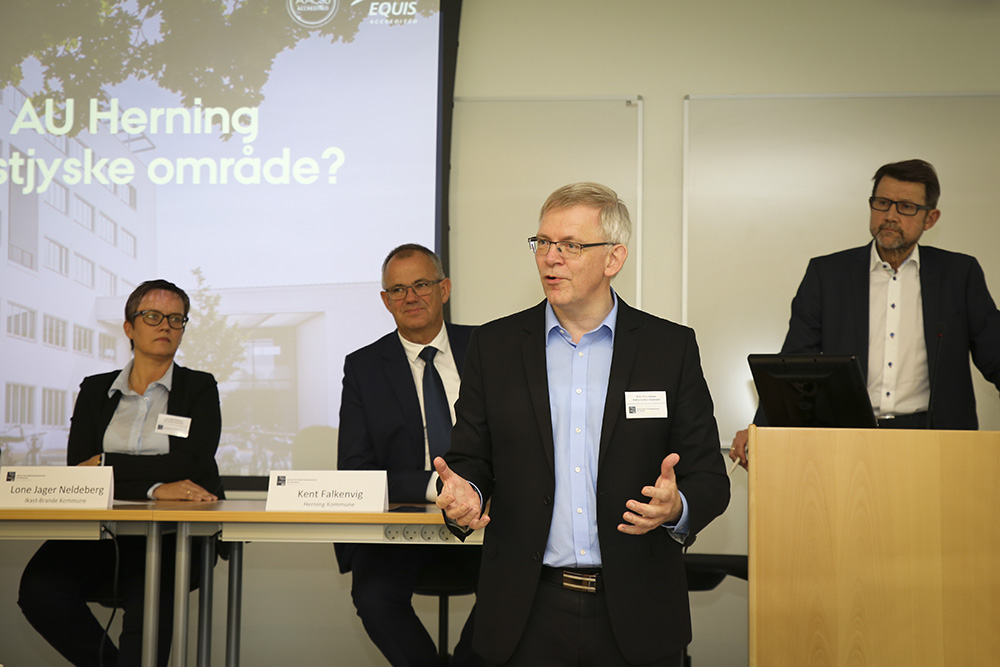The climate must be incorporated into future degree programmes
Decision-makers, business people and researchers met up at a development conference in Herning for a debate on how to rethink degree programmes. The keynote speaker, Connie Hedegaard, emphasised the world’s climate challenges and calls for “greener” degree programmes. The rector of Aarhus University will do what he can to help rethink the degree programmes of the future.








“We cannot afford not to. Climate and sustainability must be taken into account on the degree programmes of the future.”
These were the words of former EU Commissioner and present member of the Aarhus University board, Connie Hedegaard, when she gave the opening speech at the 2015 Development Conference at the Department of Business Development and Technology (Herning) on 22 October. The conference was held for the second time. Apart from Connie Hedegaard, a series of decision-makers gave their view on how to strengthen the area of Central and Western Jutland in the future. Speakers included Bent Hansen and Brian Bech Nielsen, rector of Aarhus University.
Connie Hedegaard provided the audience with many examples of the great challenges faced by the world today. She started of by showing a short film on how the earth’s temperature has risen steadily since 1880. “The world’s climate changes demand solutions, technology and knowledge,” Connie Hedegaard stated and continued:
“Aarhus University must teach their students to think in overall solutions and to master systems thinking. The more students know about the climate, technology, renewable energy, smarter transportation and energy systems, the better their projects will fare.”
When the climate contributes to making things worse
Measurements indicate that 2014 was the hottest year ever. Connie Hedegaard introduced the concept of the double challenge which focuses on how the climate can worsen the situation in a country. For example, Syria experienced an extreme drought in 2007 and in the following years. The situation was so serious that 1,500,000 million Syrians from rural areas chose to move to the large cities nearby to find work. As these cities were already struggling with a large number of Iranian refugees, they were not geared to house even more migrators looking for work and a new home. This situation caused conflicts and unrest, and the extreme drought contributed to increasing various internal threats in Syria.
Growth is coming and must be curbed
Connie Hedegaard points out that we are facing a particular challenge concerning the climate and the environment and another challenge concerning the population increase in areas such as the Middle East. Here, the population is growing rapidly, and all these people need food, energy and mobility and, at a later stage, modern conveniences.
“Growth is coming whether we want it or not,” said Connie Hedegaard.
“The question which we need to ask ourselves is how we can curb growth?” Future growth must increasingly be based on resource efficiency - that is, more on energy efficiency and less on fossil fuels.”
According to Connie Hedegaard, this change requires in-depth knowledge. Aarhus University must therefore contribute to Denmark’s ability to reuse resources and rethink economic growth, she argues. We need to think outside the box - both in society, but also at the universities. Greener degree programmes must contribute to ensuring growth in the future.
“We cannot solve the various climate problems if we have a silo mentality. The business community and organisations need to learn how to work together more efficiently - to think internationally and to see the climate challenges in a larger perspective,” said Connie Hedegaard.
A link to the change
The rector of Aarhus University, Brian Bech Nielsen, believes that the university is able to contribute to solutions for change. In his speech, he said that Aarhus University must represent the link between the local and the global.
“The world is global, and this not least applies to green solutions. In contrast, the university’s research must transfer knowledge from the global research community and open it up to local solutions in Central and Western Jutland,” said Brian Bech Nielsen and continued:
“Aarhus University must maintain strong disciplines but must also become better at combining degree programmes across academic fields.”
Brian Bech Nielsen told the audience that green and sustainable projects are not just carried out in the natural sciences. Aarhus BSS, which comprises the Department of Business Development and Technology, is part of a UN sustainability network. Here, the focus is to disseminate the principles of sustainability and responsibility.
“The university aim specifically at making difference - not just in our research, but also in our cooperation with authorities and companies,” said Brian Bech Nielsen.
The age pyramid is moving in the wrong direction
Brian Bech Nielsen concluded his speech by talking about a completely different future challenge for the area of Central and Western Jutland; the significant decrease in the number of young people in the years to come. One consequence of this may be a lack of manpower in the future, said Brian Bech Nielsen and continued:
“The problem can be solved by getting more people to move to the region, but we must also convince more young people in the area that having an education pays off.”
According to the rector, the Department of Business Development and Technology is already working closely together with the business community – and continuing this successful cooperation is a top priority. The university is also exploring the possibilities for creating more engineering degree programmes in Herning.